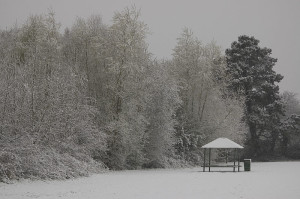
In this second part to the Winter prepping series we talk about calories. In the cold you will burn more calories. You need to make sure you count for that in your preps. I have a few thoughts on storing calories for winter. Like we talk about not all calories are equal. You will not find advice here to store up on Twinkies. Twinkies are not fit for human consumption. The only reason to store them is for barter with Woody Harrelson.
In fact we can come out of winter beach ready. Last year over winter I lost 30 pounds to get down to High school weight. Calories for winter prepping can help you or hurt you. I’ll show you how to not only store the most possible calories but to store the healthiest. Let’s jump right into Calories for Winter Prepping.
Cold Burns More Calories
We all know that extreme cold weather burns more calories right. If you watch the survival shows you know you need more calories in subzero environments The numbers I hear thrown around are an extra 400 calories an hour. Or 4,000 to 6,000 calories daily¹. Most people don’t eat that much. It is quite difficult to eat that many calories. Just ask any bodybuilder trying to gain mass. There are some tricks though to get that many calories.
Another thing to consider is temperature. Most people assume that to burn extra calories you need arctic cold. You will hear that you only burn more calories when you are shivering. This is not true. We know now about Nonshivering thermogenesis¹. This can occur in temperatures in the mid sixties. You can expect to burn an extra 30% in these mild cold temps.
You need to factor in nonshivering thermogenesis for disaster prep. If the grid is down you will be more active. Where it’s chopping wood or bugging out. You want to make sure you are eating enough to perform the work. Running out of gas in a disaster is not an option.
What Calories to Store For Winter
You could load up on highly processed junk to get your winter calories. I would recommend against it. Not only are you destroying your health you are using your space inefficiently. On long arctic trips explorers have alway used Fats to make up the calorie deficit. I remember reading about one lady that just chugged olive oil. Fat is the go to choice for winter calories.
You need to store fat for many reasons. Fat is the most concentrated form of calories. Protein and Carbs both equal 4 calories per gram. Fat has 9 calories per gram. That’s more than double. That reason alone makes it a great choice. You can store less to get as many calories.
Fat keeps you warmer. Yes eating fat will turn up the body heat. A few years ago I did a high fat experiment where I ate a 90% fat diet for 1 month. I did this during November I believe. I lost a significant amount of weight during that month. I was never hungry. I was also hot all the time. During a disaster this warmth can become very handy.
I try to eat the way our ancestors would. Vegetation is sparse during winter months. During the colder months food mostly meat and fat. I try to cut out items that wont grow. You will have some root crops and cold hardy items. Things like broccoli and cabbage.
What To Store?
Fat! Fat is the first priority in cold months. Olive oil, coconut oil, lard and butter are all good choices. I’m sure many of you are saying that;s not food James. Well you are wrong. I’ll share some recipes with you that are mostly fat later in the month. You can put butter and coconut oil in your coffee. Add more fat to your foods. I never eat steak anymore without butter on top. Jimmy Moore uses a pat of butter with every bite of food. Just cooking with more fat should help out though.
Canned meats are another. Home canning would be best but store-bought is fine. I like Libby’s seasoned beef crumbles, spam and corned beef. All of these make tasty meals. Last year I made chili with home canned beef. It was so tasty.
Being cold the freezer is your friend. Make up soups and chilies and freeze them. It the power goes out store them outside. It makes meals fast and easy. I like to eat a lot of soup during the colder months. Make them up in huge batches and freeze them in small batches.
If you have a root cellar store roots crops in there. They will last the winter. Take some of your cabbage and make sauerkraut out of it. Sauerkraut will also last the season. It will also give you vitamin C.
That wraps up part two of the winter prepping series. Still so much to write about but it will have to wait. I’ll share some recipes with you to use that stored fat.
Like this post Consider signing up for my email list here > Subscribe
Think this post was worth 20 cents? Consider joining The Survivalpunk Army and get access to exclusivecontent and discounts! |
Also please enter our Reader appreciation contest and help spread the word about our blog.
Looking for the best prices and best customer service in buying Silver and Gold online? Look no further than JM Bullion for all your precious metal needs!
Looking for Camping and Survival gear? Need to Stock up on Fish antibiotics? Head over to Camping Survival!

Looking to stock up on Ammo? Check out Freedom Munitions for all the calibers you’re looking for with free shipping!
Looking for improve your morning cup of coffee? Check out Mai Thai Coffee and stock up on the most important Prep!





I’m looking forward to your tasty winter paleo recipes. Nom Nom Nom.
I liked this blog. I find so many people are stocking things like, beans, rice, water, and very little else. They seem to think as long as they have some kind of food they can make it. One of the major causes of death 200 yrs ago was lack of vitamin and minerals in the winter. People were very sick or even died from lack of knowledge and I am afraid that even in this age many people could also die from lack of knowledge. I am shocked at how many people there are that don’t know that fat is a very important part of a healthy diet. Thank you for making people aware of what they need to live and be well. Keep up the good work.